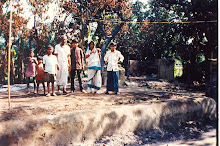The Daily Star, Dhaka
Thursday, August 30, 2012 Front Page
Kamaruzzaman's War Crimes
Witness recalls brother's killing
Staff Correspondent A witness yesterday told International
Crimes Tribunal-2 Jamaat-e-Islami leader Muhammad Kamaruzzaman and his
accomplices killed his brother at Serih Bridge in Sherpur on August 23, 1971.
Musharraf Hossain Talukder, brother of martyr Gholam Mostafa
and the fifth prosecution witness in the war crimes case against the Jamaat
assistant secretary general, said a case was filed after liberation against
Kamaruzzaman in connection with the killing. The 56-year-old witness said after
the nine-month war, they had heard about the killing from one Abul Kashem, who
was also shot by Kamaruzzaman and his accomplices that day.
Terming Kamaruzzaman as the chief organiser of Al-Badr, an
auxiliary force of the Pakistan occupation army in greater Mymensingh, and
controller of the Al-Badr camps in the area during the war, Musharraf appealed
to the tribunal to try him for "committing crimes against humanity,
including the killing of his brother [during the war]."
On June 4, the tribunal framed seven charges against
Kamaruzzaman, who hails from Sherpur, in connection with the murder and torture
of unarmed civilians during the war. The fourth charge is related to the
killing of Mostafa. The two-member tribunal headed by Justice ATM Fazle Kabir
with member Judge Md Shahinur Islam also recorded the cross-examination of
Musharraf before adjourning the case proceedings until today.
Another member of the tribunal was absent yesterday due to
the death of his father. During his 45-minute testimony, Musharraf said he was
a class VII student of Sherpur GK High School and Golam Mostafa, the eldest
among his seven brother and sisters, was an HSC examinee from Sherpur College
during the War.
Musharraf said Mostafa, at the time literary secretary of
Sherpur College unit Chhatra Union and a regular contributor to Radio Rajshahi,
went to India for arms training after March 26, 1971, and returned after around
one and a half months. Before the HSC examinations in 1971, it was announced
that those who would not take part in the exam would be counted as
"anti-Pakistani and supporters of freedom fighters", said the
witness.
Musharraf said Tofael Islam, one of his paternal uncles in
his village Kharkharia, was a member of the Shanti Committee, another auxiliary
force of the Pakistan army. He had convinced Mostafa to sit for the exam,
assuring him of all-out support. "After Maghrib prayers on August 23
[1971]… my brother went to Sherpur College intersection to buy batteries for
the radio," said the witness.
"At that moment, at the diktat of Sherpur Al-Badr chief
Kamaruzzaman, some of his followers picked up my brother and took him to a camp
set up at the house of Surendra Mohan Saha, a prominent businessman of
Sherpur," said Musharraf. He said after learning of the matter, the family
informed Tofael Islam about it and he went to the Al-Badr camp and met Mostafa
that night.
"He [Tofael] met Kamaruzzaman at the Al-Badr camp and
requested him to release my brother," said the witness, adding that
Kamaruzzaman asked his uncle to leave the camp. Later, Tofael requested another
Shanti Committee leader Samidul Haque to release Mostafa and Samidul also
requested Kamaruzzaman, said Musharraf.
"On that night [August 23, 1971] Kamaruzzaman along
with some Al-Badr men took my brother to Serih Bridge over the Mrigi
river," said the witness. "One Abul Kashem was also taken to the
bridge. At first, he [Mostafa] was charged with bayonet and afterwards he was
shot to death," said an emotional Musharraf, adding, "Kashem survived
as he jumped into the river with bullet injuries on the fingers of his right
hand."
"After the Liberation War, Abul Kashem met us and told
us about the killing," said the witness, adding that on August 24, some
people from his village recovered Mostafa's body from the northeast side of the
bridge and brought him to their village. "I had seen the body. There was
no flesh under the right knee and he received bullets on his chest," added
the witness.
He said after the Liberation War, either his father or his
mother filed a case with local police against Kamaruzzaman along with some
other Al-Badr members in connection with the killing. After his testimony,
defence counsel Kafiluddin Chowdhury cross-examined the witness for one hour
and asked him around 30 questions.
Replying to a question, Musharraf said their house in
Sherpur town was looted during the war. Meanwhile, the same tribunal completed
recording the cross-examination of Abdul Momen, the first prosecution witness
in the war crimes case against former BNP lawmaker Abdul Alim.
Witness Momen, a former student leader, testified before the
tribunal on August 6 when he said the former BNP lawmaker had ordered the
killing of nine Hindus of Khetlal upazila in Joypurhat during the war. During
the cross-examination, defence counsel AEM Khalilur Rahman said on April 20,
1971, Alim left Joypurhat sadar after hearing that the Pakistan army had killed
former minister Fazlul Bari on March 27, and took shelter in Paikar village in
Amdai union for three to four months.
But in his testimony, Momen said a few days before
Eid-ul-Fitr in 1971, Abdul Alim and Major Afzal, a Pakistani army officer
responsible for Joypurhat during the war, came to Hatsahar Hat in Khetlal where
they addressed a meeting and he heard Alim's speech 30-40 yards away from the
spot.
"You have given false testimony for financial
benefit," charged the defence counsel.

No comments:
Post a Comment